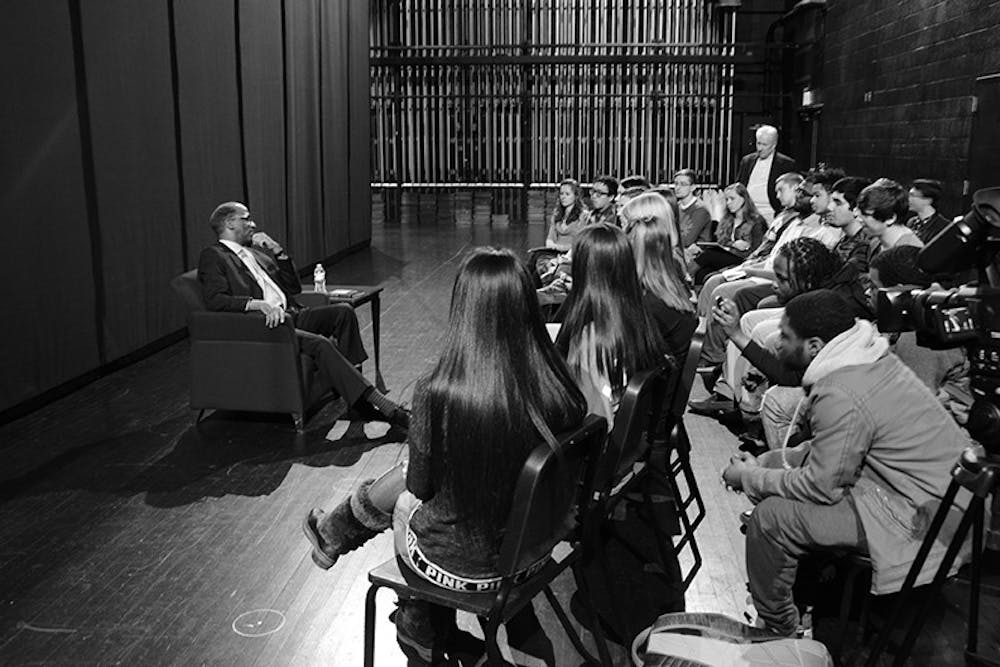Wil Haygood sat in front of the students in a simple black suit, pale blue shirt, yellow tie and black Oxford shoes on Thursday evening in the Luhrs Performing Arts Center.
Haygood is a Pulitzer Prize finalist and the journalist who discovered the story of the White House butler, Eugene Allen, who worked for eight U.S. presidents. Allen’s story was published by Haygood in the Washington Post and later became the movie, “The Butler.”
Before the speech he was to give later that night, Haygood sat down with a group of students, answering any questions they had. He introduced himself, explaining that he was a former reporter for the Washington Post, Boston Globe and a foreign correspondent.
The questions he answered ranged from how it felt to see Nelson Mandela walk out of prison to what it was like to report on the ground during the aftermath of Hurricane Katrina. But this was only the start of his night.
After answering these questions in great detail, Haygood then moved onto a dinner that was being held for the H.O.P.E. Diversity Scholarship Program, which recognized the donors and students that received the scholarship.
At the dinner, the most recent recipients, Fatemah Butler, Hannah Coath, Joshua Coffey, Tiffany Dao, Emmanuel Douge and Joshua Varone, all spoke, thanking the donors. The students also explained their diverse backgrounds.
One student came to America all the way from Haiti, while another explained how she came from an inner city school, determined to get good grades, despite her situation.
Later at Luhrs, Haygood started off his speech with a video that aired on the Oprah Winfrey Network, giving some background to the start of “The Butler.” Haygood then explained where he got the idea to write a feature story on someone like Allen.
One night while Haygood was following then-Sen. Barack Obama’s campaign trail for president, he saw three white girls sitting outside crying. After asking them what was wrong, Haygood found out the girls had been kicked out of their homes for supporting Obama. In his hotel room later that night, Haygood became convinced that Obama would win the presidential election.
This then led Haygood to the idea that he needed to find someone who had worked in the White House during the segregation and civil rights era. Haygood approached his editor with the idea. His editor gave him a week to pull something together.
After Haygood placed 50-some phone calls looking for a butler named Eugene Allen, he finally made contact with him.
Haygood then set up an interview within the next few days. After checking out the quiet neighborhood, Haygood knocked on the door to be greeted by Allen and his wife, Helene.
During the interview, Allen revealed that he was born in the south and had made his way to Washington, D.C., where he ended up working in a country club. It was there that he got an offer to work in the White House as a dishwasher.
Allen then explained that he saw many key issues play out while he was in the White House. Those events included the Selma march, voter rights and even the Vietnam War. Allen also got to meet the Rev. Martin Luther King Jr., as well as other famous figures.
Allen then explained that he saw many key issues play out while he was in the White House. These events included the Selma march, voter rights and even the Vietnam War. Allen also got to meet the Rev. Martin Luther King Jr., as well as other famous figures.
After a few hours into the initial interview, Helene looked at Allen and said Allen could show Haygood something. Haygood was then lead to a padlocked basement door.
Below the floorboards of the Allens’ house was what Haygood described as a museum of White House history. There were pictures of Allen with several different presidents and different items from the White House. There were also 20 thick photo albums that held even more pictures of the White House.
When Haygood asked why no one had written about Allen before, Allen said, “If you think I’m worthy, you’ll be the first.”
Haygood’s response was, “If it’s the last thing I do, I’ll write about your life.”
Haygood then wrapped up the speech at Luhrs with the idea that “the first shall be last and the last shall be first,” tying into the idea that the H.O.P.E. Diversity Scholarship recipients were awarded for their hard work and determination, adding to the idea that dreams and hard work can get you anywhere.




The Slate welcomes thoughtful discussion on all of our stories, but please keep comments civil and on-topic. Read our full guidelines here.